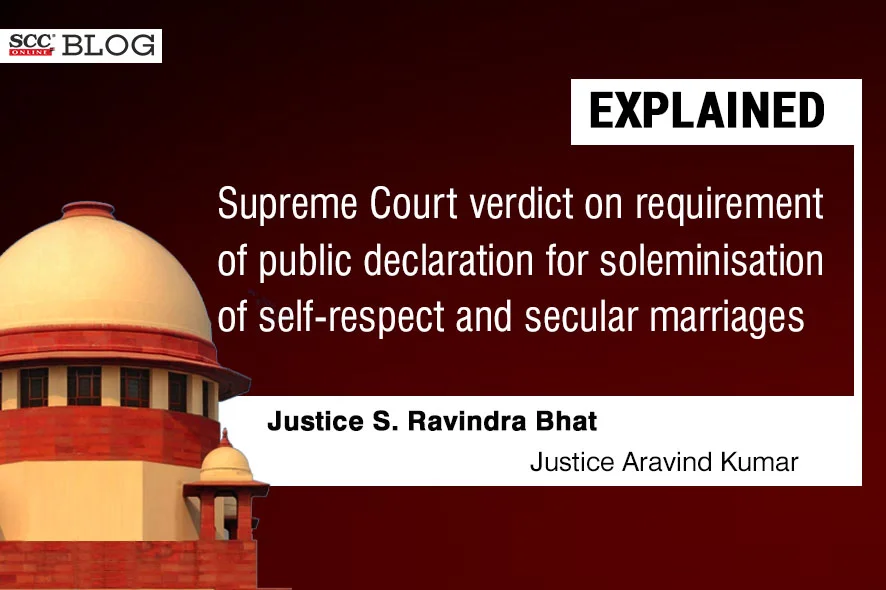Supreme Court: In an appeal against the Madras High Court order holding public declaration, a mandatory requirement for solemnization of marriage under Section 7-A of the Hindu Marriage Act, 1955, the division bench of S. Ravindra Bhat* and Aravind Kumar, JJ. has said that to superimpose the condition of a public declaration for solemnizing marriage, which is absent in Section 7-A of the Hindu Marriage Act, 1955, is not only narrowing the otherwise wide import of the statue but also would be violative of the rights under Article 21 of the Constitution of India. Further, the Court overruled S. Balakrishnan Pandiyan v. Superintendent of Police, 2014 SCC OnLine Mad 8815 in S. Nagalingam v. Sivagami, (2001) 7 SCC 487.
Background:
The appellant had preferred a habeas corpus proceeding, alleging that he got married in accordance with Section 7-A of Hindu Marriage Act, 1955 and the same was solemnized under the aegis of Advocates and other social workers. He had alleged that his wife had been forcibly taken away, coerced into marrying her maternal uncle, after which she was restrained at the behest of her parents. The appellant alleged that his wife was detained or restrained against her will. The Madras High Court dismissed the petition and recorded comments adverse to the conduct of Advocates, stating that they are incapable of certifying marriages under Section 7A of the Hindu Marriage Act, 1955. Thus, the appellant has filed the present appeal.
Analysis:
After perusing the statement of the wife recorded by the Secretary, District Legal Services Authority under Section 164 of the Code of Criminal Procedure, 1973 (CrPC), the Court was satisfied that the wife, in fact, wishes to reside with the appellant by her freewill. Thus, the Court directed the police to ensure that she in fact joins the appellant.
The Court noted that the High Court in the impugned order, followed a previous decision of a co-ordinate bench in S. Balakrishnan Pandiyan (supra). The Court said that the Madras High Court took note of the Tamil Nadu Amendment Act and the Hindu Marriage Act, especially Section 7A which dispensed with the necessity of solemnizing marriage in terms of the forms enumerated in other provisions of the Hindu Marriage Act and described a special procedure under the newly inserted provision, Section 7A. This provision merely required the intending spouses to declare and express to each other their willingness to take each other as spouses and symbolically garlanding each other and tying a “Thali”. The Court interpreted the procedure of declaration by the intending spouses “in the presence of relatives, friends or other persons”. The High Court believed such marriages involved a public declaration.
Further, the Court noted that, this Court in S. Nagalingam (supra), had upheld Section 7-A in the Hindu Marriage Act, 1955 as inserted by the Hindu Marriage (Tamil Nadu Amendment) Act, 1967. This provision applies to any marriage between two Hindus solemnized in the presence of relatives, friends or other persons and that the presence of a Priest is not mandatory for the performance of a valid marriage.
The Court opined that the views expressed by the High Court in S. Balakrishnan Pandiyan (Supra), were erroneous, as it is premised on the assumption that every marriage requires public solemnization or declaration. The Court said that such a view is simplistic because often due to parental or pressure among kinship groups, or caste/community institutions, couples intending to enter matrimony may not be able to hold or give such a public declaration. Doing so would imperil their lives or could in the very least likely result in danger to their bodily integrity or at worst, a forceable or coerced separation of one from the other. It is not hard to visualize other pressures being brought to bear upon two individuals, who are otherwise adults and have exercised their freewill. To superimpose the condition of a public declaration, which is absent in Section 7A, is not only narrowing the otherwise wide import of the statue but also would be violative of the rights under Article 21 of the Constitution of India.
The Court further took note of Lata Singh v. State of U.P., (2006) 5 SCC 475 and various other cases, wherein the Court upheld the right of individuals to exercise free choice and that it is an intrinsic part of the right to life. Therefore, the Court held that view expressed in S. Balakrishnan Pandiyan (Supra) is erroneous and overruled it in Nagalingam (supra).
The Court further noted the observations made by the impugned order, with respect to the role of the advocates, and said that the concerns voiced by the High Court are not entirely unfounded. Advocates or lawyers have many capacities, one being Officers of the Court. Therefore, they should not, while acting as counsel or advocates or in their capacity as advocates, undertake or volunteer to solemnize marriages. As, this can result in Advocates chambers or offices turning out to be matrimonial “establishment”, which is never intended or perhaps never contemplated by law. However, in their capacity as friends or relatives of the intending spouses, their role as witnesses cannot be ruled out.
[Ilavarasan v. State, 2023 SCC OnLine SC 1120, decided on 28-08-2023]
*Judgment Authored by: Justice Ravindra Bhat










This is an insightful exposition into self-respect marriages. Thanks for this!